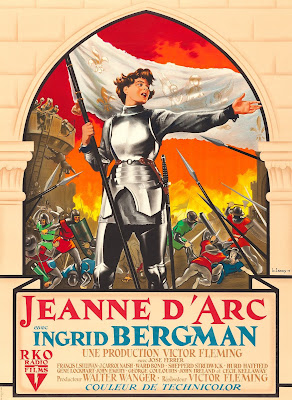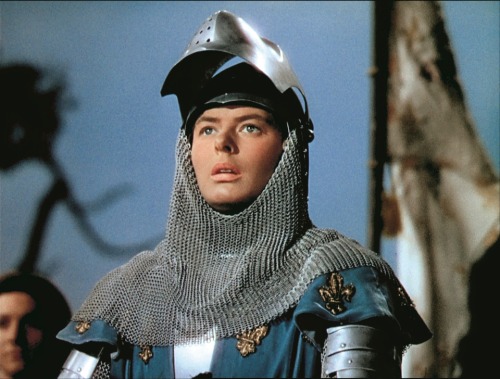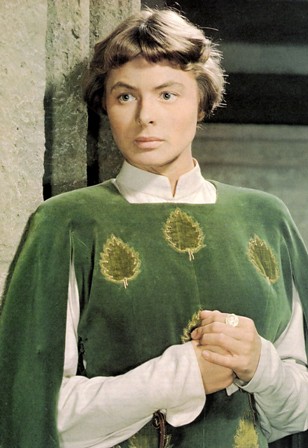O filme nem precisa começar para termos certeza de que estamos assistindo a uma obra do diretor Victor Fleming. É um filme longo (145 minutos!) e os atores nos são apresentados em uma lista muito semelhante à que aparece no início de “E o Vento Levou / Gone with the Wind” (1939). É um elenco enorme, um épico em Technicolor e sua protagonista é uma personagem feminina forte e inesquecível – mais até que Scarlett O’Hara.
The film hasn’t even started and we’re already sure that we’re watching a Victor Fleming production. It’s a long film (145 minutes!) and the actors are presented in the beginning in a list that looks a lot with the opening credits of “Gone with the Wind” (1939). It has a huge cast, it is an epic in Tehcnicolor and the lead is a strong and unforgettable female character – even more iconic than Scarlett O’Hara.
Você já deve conhecer um pouco da história: o ano é 1429. A Inglaterra e a França estão em guerra há quase 100 anos (o conflito começou em 1337). Uma jovem camponesa de 17 anos, Joana D'Arc (Ingrid Bergman) recebe um chamado de Deus, dizendo-lhe que ela deve procurar o Delfim Carlos (José Ferrer) e comandar um exército que levará a França à vitória. O Delfim será coroado rei, com o título de Carlos VII, seguindo a vontade de Deus. Claro que isso não é uma missão fácil. Joana encontra muitas dificuldades em seu caminho, seja com as autoridades ou com os capitães no campo de batalha. É difícil para eles seguir as ordens de uma moça, e nem de longe este machismo fica restrito ao século XV em que se passa o filme. Joana D’Arc é uma figura histórica e religiosa, mas os temas de seu drama não poderiam ser mais atuais. Além do machismo, há as lutas políticas e a corrupção.
You may already know the essentials about the story: the year is 1429. England and France have been at war for nearly 100 years (the war started in 1337). A 17 year-old peasant, Joan of Arc (Ingrid Bergman) receives a message from God saying that she must go to the Dauphin Charles (José Ferrer) and lead the army that will make France will the war. The Dauphin will be proclaimed King Charles VII, as God wishes. Of course this won’t be an easy task. Joan meets many obstacles in her way, both with authorities and with commanders in the battlefield. For them, it’s difficult to follow the orders of a young woman, and this sexist bias is not something that was left behind in the 15th century. Joan of Arc is a historical and religious figures, but the themes of her story couldn’t be more modern. Besides sexism, there are political disputes and corruption.
Como Joana D'Arc, Ingrid Bergman jamais aparenta ser uma adolescente (a estrela tinha 33 quando o filme foi feito), mas esta falha é perdoável. Ingrid imprime uma força sobrenatural ao papel, com sua voz grave nos momentos de dar ordem, e com doçura e inocência no olhar ao falar de Deus e das vozes dos santos que ouve. Gosto de pensar que a voz da maior intérprete de Joana D'Arc, Renée Falconetti (de “A Paixão de Joana D'Arc”, 1928) de alguma maneira se assemelharia à de Ingrid. Há convicção total na Joana D'Arc de Bergman, e ao mesmo tempo uma pureza descomunal.
As Joan of Arc, Ingrid Bergman never looks like a teenager (she was 33 when the film was made), but this is forgivable. Ingrid offers a supernatural strength to the role, with a deep voice when she's giving orders and with a sweet, innocent look when she talks about God and the voices of the saints she hears. I like to think that the voice of the actress who gave the best performance as Joan of Arc, Renée Falconetti (from “The Passion of Joan of Arc”, 1928) in some way sounded like Ingrid's voice. There is total conviction in Bergman's Joan of Arc, and at the same time a colossal purity.
Em 1946, Bergman protagonizou a peça “Joan of Lorraine”, que foi a base do filme. Entretanto, a peça é metalinguística, pois mostra como os atores de uma montagem de Joana D’Arc têm suas vidas mudadas pelos personagens que interpretam. Para os padrões de Hollywood, foi necessária uma história mais convencional, e sobrou apenas a trajetória da mártir no roteiro (imagine se o filme fosse feito na Inglaterra: Laurence Olivier perfeitamente obteria o efeito “teatro filmado”). Bergman queria muito fazer o filme, e por isso se juntou ao marido, o dentista Peter Lindstrom, ao diretor Fleming e ao produtor Walter Wanger para criar a Sierra Pictures – cujo primeiro e único projeto foi este épico impressionante.
In 1946 Ingrid starred in the play “Joan of Lorraine”, thar served as the basis for the film. The play, however, is metalinguistic, as it shows how the actors appearing in a play about Joan of Arc have their lives changed by the roles they play. In order to follow Hollywood patterns, the story became more conventional, focusing only in the martyr's trajetory (imagine if the film was made in England: Laurence Olivier could perfectly obtain the effect of “filmed theater”). Bergman really wanted to make the film, that's why she, her husband, the dentist Peter Lindstrom, the director Victor Fleming and the producer Walter Wanger got together and created Sierra Pictures – whose first and only project was this impressive epic film.
. |
| Victor Fleming e Ingrid Bergman |
Talvez você também saiba qual foi o destino da película. Pouco após a estreia, Ingrid se envolveu com o diretor italiano Robert Rossellini e ganhou a antipatia dos americanos, que por sua vez se recusaram a ver uma adúltera interpretando uma santa no cinema. Victor Fleming faleceu poucos meses após o final das filmagens, e no auge do escândalo Bergman/Rossellini, o filme foi editado para uma versão de apenas 100 minutos, perdendo muito de suas características. Apenas em 1998 uma restauração foi feita e a versão completa ressurgiu.
Maybe you already know which was the fate of this film. A little after the premiere, Ingrid got involved with the Italian director Roberto Rossellini and became a pariah in the USA, as the public refused to see an adulterous woman playing the role of a saint onscreen. Victor Fleming passed away a few months after filming and, in the apex of the Bergman/Rossellini scandal, the film was edited into a 100-minute version, losing a lot of its characteristics. Only in 1998 a restoration was made and the complete version reappeared.
A versão de Joana D’Arc de 1948 é mais completa que o clássico silencioso de 1928? Provavelmente, pois conta tudo que se sabe sobre a santa, mesmo que ainda haja muitas dúvidas e lendas sobre ela. Mas jamais será mais emocionante. Mais bonita, sim, em fotografia Technicolor ganhadora do Oscar, mas a versão de 1928 tem em sua crueza o maior trunfo. Os algozes de Falconetti são mais dignos de ódio que os de Bergman. O julgamento da Joana D’Arc de Bergman é desonesto, o de Falconetti é desumano.
Is the 1948 version more complete than the silent classic from 1928? Probably, because it tells everything we know about the saint, even though there are still many doubts and legends about her. But it's not as emotive – and it'll never be. Prettier, yes, in an Oscar-winning Technicolor photography, but the 1928 has in its rawness its biggest triumph. Falconetti's accusers are more hateful than Bergman's. The judgement of Bergman's Joan of Arc is dishonest, the judgement of Falconetti's is inhuman.
Bergman mal sabia que seu relacionamento com Rossellini faria dela uma espécie de mártir da moral e dos bons costumes hipócritas da sociedade pós-Segunda Guerra Mundial. Em 1954 ela voltaria a interpretar Joana D’Arc, dirigida pelo novo marido em um filme estranhíssimo (afinal, é um musical!). Mas, apesar das críticas e do pouco caso com que é tratada, é a versão de 1948 que traz uma das melhores Joana D’Arc do cinema. É a força de Ingrid Bergman, atuando, como sempre, com perfeição.
Bergman barely knew that her relationship with Rossellini would make her some kind of martyr of morality and hypocritical good costumes in the post-WWII societey. In 1954 she would again play Joan of Arc, directed by her new husband in a very strange film (after all, it's a musical!). But, even with the critics and the near erasure it's the 1948 version that brings one of the best Joans of Arc in the history of film. It's Ingrid Bergman's strangth, who once again acts with perfection.






9 comments:
eu vi o do luc besson há anos. beijos, pedrita
That's interesting how it was so heavily edited. That's the plus of living today. We may not get to see the old films on the big screen but we get additional footage and special features!
A very beautiful and poetic portrait of Joan of Arc :) Ok, I haven't seen the film yet, but I really want to, especially because it was Ingrid's dream to play the role of Joan of Arc. I'm sure she's excellent in this film! Thanks for taking part of the blogathon! :)
Of course I also invite you to read my article for the blogathon, a tribute to Ingrid Bergman in honour of her 100th :)
https://thewonderfulworldofcinema.wordpress.com/2015/08/26/ingrid-bergman-a-fascinating-woman/
I can only imagine the uproar that was caused by Ingrid Bergman's affair with Roberto Rosselini as this movie was being released. That was quite a scandal!
I have not seen this film, so I was glad to read your review. Thanks!
This may be an unpopular thing to say, but I preferred the edited version. The full-length movie drags too much. Nevertheless, Ms Bergman was exceptional, as usual.
Parabéns querida amiga pela excelência da postagem.Bjs.SU
Assisti ao filme um tempo atrás e não gostei muito dele, realmente é muito longo e o ritmo muito lento e nunca emociona, só a fotografia é que se salva. Muito melhor é a versão com a Falconetti, que mesmo se visto no youtube faz você mergulhar no drama.
A Título de curiosidade, Greta Garbo quase fez Joana d'Arc com roteiro da amiga Mercedes de Acosta e Katherine Hepburn também se interressou e chegou a fazer testes de Technicolor com Merian C. Cooper produtor de King Kong.
Tem todas as qualidades e defeitos de um filme hollywoodiano: emotivo talvez demais, mostra uma Joana tímida e fraca. Mas o final é belíssimo.
Post a Comment